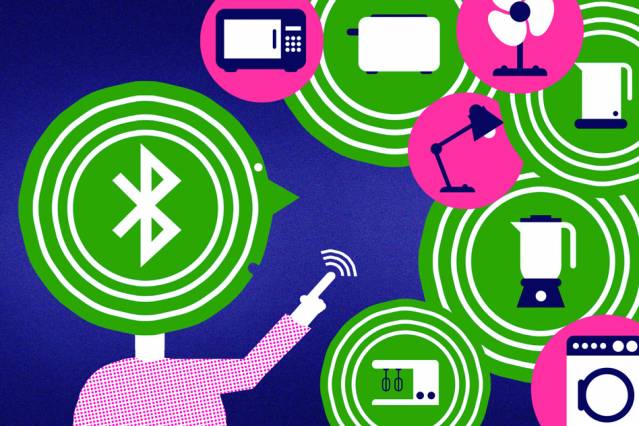
The technology world is looking at ways to make everything more efficient. The question is, will this be good for the many, or the mighty few?
Earlier this month, General Electric announced it was selling GE Capital, its financial arm. With less fanfare, G.E. also unveiled plans for computer-connected L.E.D. streetlights, so cities can collect and analyze performance data, for lower costs and better safety.
GE Capital was a huge profit center after the financial deregulation of the 1980s, but that was then. Sensor-rich lights, to be found eventually in offices and homes, are for a company that will sell knowledge of behavior as much as physical objects.
“The next generation of bulbs have a life cycle of 20 years; we can’t think of that as a transactional business anymore,” said Bill Ruh, the head of G.E.’s software center. “We can put cameras and more sensors on these, and measure motion, heat, air quality.” Retailers might want such lights to steer shoppers, he said, while consumers could better learn about their electricity consumption.
This sensor explosion is only starting: Huawei, a Chinese maker of computing and communications equipment with $47 billion in revenue, estimates that by 2025 over 100 billion things, including smartphones, vehicles, appliances and industrial equipment, will be connected to cloud computing systems.
The Internet will be almost fused with the physical world. The way Google now looks at online clicks to figure out what ad to next put in front of you will become the way companies gain once-hidden insights into the patterns of nature and society.
G.E., Google and others expect that knowing and manipulating these patterns is the heart of a new era of global efficiency, centered on machines that learn and predict what is likely to happen next.
“The core thing Google is doing is machine learning,” Eric Schmidt, Google’s executive chairman, said at an industry event on Wednesday. Sensor-rich self-driving cars, connected thermostats or wearable computers, he said, are part of Google’s plan “to do things that are likely to be big in five to 10 years. It just seems like automation and artificial intelligence makes people more productive, and smarter.”
Not only that, but big tech companies have also decided that supplying the means for others to analyze data is going to be a big business, too. Amazon, which last week stunned Wall Street with word that its online sales of computing were a $5 billion annual business vastly more profitable than the rest of the company, has started selling data analysis tools as part of its service.
Microsoft, which over the years invested billions in machine learning, last summer offered a service others can rent on the Microsoft cloud. IBM, rushing to catch up, has put Watson, its “Jeopardy!”-winning computer, in the cloud for others to use.
What we may be seeing here is a repeat of what happened in online search, the original big digital pattern-finding business. Google won that business partly by investing heavily in almost every aspect of computer science, until only Microsoft could afford to keep up.
The great data science companies of our sensor-packed world will have experts in arcane reaches of statistics, computer science, networking, visualization and database systems, among other fields. Graduates in those areas are already in high demand.
Nor is data analysis just a question of computing skills; data access is also critically important. As a general rule, the larger and richer a data set a company has, the better its predictions become.
Read more: The Sensor-Rich, Data-Scooping Future
The Latest on: Data collection
[google_news title=”” keyword=”Data collection” num_posts=”10″ blurb_length=”0″ show_thumb=”left”]
via Google News
The Latest on: Data collection
- New legislation would allow Minnesotans control of their personal data onlineon May 1, 2024 at 3:28 pm
Part of the Omnibus Commerce, Energy and Agriculture Bill, the law requires companies to allow Minnesotans to opt-out of data collection and sales.
- Abortion data bill raises concerns among providers, privacy advocateson May 1, 2024 at 2:19 pm
During a hearing in the House Health and Human Services Committee, Hennessey asked lawmakers to expand the data collected to include any post-abortion complications, and to amend the bill to include ...
- Ditch Microsoft’s data-gathering and take control of your Windows 11 experience with the new Tiny11 Builder toolon May 1, 2024 at 10:58 am
The developers of Tiny11 (a slimmed-down third-party version of Windows 11) have released a new version of their Tiny11 Builder, a tool that enables you to modify and customize your own version of ...
- BBB National Programs Issues Compliance Warning for Use of AI in Child-Directed Advertising and Data Collectionon May 1, 2024 at 6:52 am
BBB National Programs Issues Compliance Warning for Use of AI in Child-Directed Advertising and Data Collection ...
- Best Practices for Data Collection and Preservation in Legal Holdson April 30, 2024 at 5:00 pm
In this article, we explore best practices for ensuring compliance with data preservation and collection requirements. Businesses should focus their efforts on integrating legal hold tools, issuing ...
- Comments Regarding Data Collection for Gainful Employment and Financial Value Transparencyon April 29, 2024 at 1:29 pm
In February 2024, the Department of Education, in compliance with the Paperwork Reduction Act, posted information about data it plans to collect to implement new Gainful Employment and Financial Value ...
- FMCSA Researchers Outline Safety Studies, Data Collectionon April 29, 2024 at 8:22 am
be more focused in scope and involve more streamlined data collection, Meyer said. “Starting next year, we will complete the training of the state CMV analysts, crash investigation and inspection ...
- The Editorial Board: Data collection is key to improving the East Side's air qualityon April 28, 2024 at 3:30 am
Using technology to determine air quality in neglected neighborhoods may seem quite sensible - and not exactly revolutionary. But such an assumption would gravely underestimate the difficulty communit ...
- TSA Seeks Innovative Solutions for Automated Field Data Collection to Enhance Security Screeningon April 26, 2024 at 5:00 pm
As part of an initiative to improve the efficiency and performance of screening technologies at airports, TSA is looking for cost-effective, automated solutions that could replace traditional, ...
- White House hopeful ‘more maturity’ of data collection will improve AI inventorieson April 22, 2024 at 1:23 pm
Communication and skills for collecting and sorting the information in artificial intelligence inventories have gotten better, Deputy Federal CIO Drew Myklegard told FedScoop.
via Bing News










